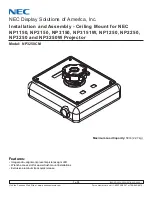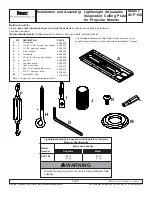
G
General notes
– This device may only be used in pollutant-free non-precipitating air without above-atmospheric or below-atmospheric pressure at the sensor element.
– On outdoor and duct sensors, the sinter filter of the senor element protects the humidity sensor against potential dust exposure.
In case of pollution ⁄ contamination, this filter should be cleaned on a regular basis.
– Dust and pollution falsify measurement results and are to be avoided. Slight pollution and dust sediments can be removed by using compressed air.
– The CO
2
sensor is shock-sensitive. Due to the mechanism’s design, the measuring result may vary if shaken.
– In case of pollution, we recommend cleaning and recalibration in the factory.
– In any case, the sensor must not get in contact with chemicals or other cleaning agents.
– Extremely high concentrations of VOCs, aggressive cleaning agents or silicone-containing vapours can destroy the sensor element or
reduce its service life drastically.
– When several sensors (0 -10 V) are connected to one voltage supply of 24 V AC, correct polarity must be regarded as otherwise the alternating voltage
source may be short-circuited.
– The voltage outputs are short-circuit proof. Applying overvoltage or voltage supply to the voltage output will destroy the device.
– If this device is operated beyond the specified range, all warranty claims are forfeited.
Our “General Terms and Conditions for Business“ together with the “General Conditions for the Supply of Products and Services of the Electrical and
Electronics Industry“ (ZVEI conditions) including supplementary clause “Extended Retention of Title“ apply as the exclusive terms and conditions.
In addition, the following points are to be observed:
– These instructions must be read before installation and putting in operation and all notes provided therein are to be regarded!
– Devices must only be connected to safety extra-low voltage and under dead-voltage condition. To avoid damages and errors at the device (e.g. by voltage
induction) shielded cables are to be used, laying parallel with current-carrying lines is to be avoided, and EMC directives are to be observed.
– This device shall only be used for its intended purpose. Respective safety regulations issued by the VDE, the states, their control authorities, the TÜV and
the local energy supply company must be observed. The purchaser has to adhere to the building and safety regulations and has to prevent perils of any kind.
– No warranties or liabilities will be assumed for defects and damages arising from improper use of this device.
– Consequential damages caused by a fault in this device are excluded from warranty or liability.
– These devices must be installed and commissioned by authorised specialists.
– The technical data and connecting conditions of the mounting and operating instructions delivered together with the device are exclusively valid. Deviations
from the catalogue representation are not explicitly mentioned and are possible in terms of technical progress and continuous improvement of our products.
– In case of any modifications made by the user, all warranty claims are forfeited.
– This device must not be installed close to heat sources (e.g. radiators) or be exposed to their heat flow.
Direct sun irradiation or heat irradiation by similar sources (powerful lamps, halogen spotlights) must absolutely be avoided.
– Operating this device close to other devices that do not comply with EMC directives may influence functionality.
– This device must not be used for monitoring applications, which serve the purpose of protecting persons against hazards or injury,
or as an EMERGENCY STOP switch for systems or machinery, or for any other similar safety-relevant purposes.
– Dimensions of housings or housing accessories may show slight tolerances on the specifications provided in these instructions.
– Modifications of these records are not permitted.
– In case of a complaint, only complete devices returned in original packing will be accepted.
Notes on commissioning:
This device was calibrated, adjusted and tested under standardised conditions. When operating under deviating conditions, we recommend performing an
initial manual adjustment on-site during commissioning and subsequently at regular intervals.
Commissioning is mandatory and may only be performed by qualified personnel!
These instructions must be read before installation and commissioning and all notes provided therein are to be regarded!
Connecting scheme
Parallel operation
Connecting scheme
Individual operation
Circuitry
Circuitry
Output
0V/GND
Output
0V/GND
Power supply
AC 24V~
0V
DC 15-36V = GND
Circuitry
Output
0V/GND
Power supply
AC 24V~
0V
DC 15-36V = GND
SUPPLY VOLTAGE :
For operating voltage reverse polarity protection, a one-way rectifier or
reverse polarity protection diode is integrated in this device variant.
This internal one-way rectifier also allows operating 0 - 10 V devices on AC
supply voltage.
The output signal is to be tapped by a measuring instrument. Output
voltage is measured her against zero potential (O V) of the input voltage!
When this device is operated on
DC supply voltage
, the operating voltage
input UB+ is to be used for 15...36 V DC supply and UB – or GND for
ground wire!
When several devices are supplied by one 24 V
AC voltage supply
, it is to
be ensured that all ”positive“ operating voltage input terminals (+) of the
field devices are connected with each other and all ”negative“ operating
voltage input terminals (–) (= reference potential) are connected together
(in-phase connection of field devices). All outputs of field devices must be
referenced to the same potential!
In case of reversed polarity at one field device, a supply voltage short-
circuit would be caused by that device. The consequential short-circuit
current flowing through this field device may cause damage to it.
Therefore, pay attention to correct wiring!


































